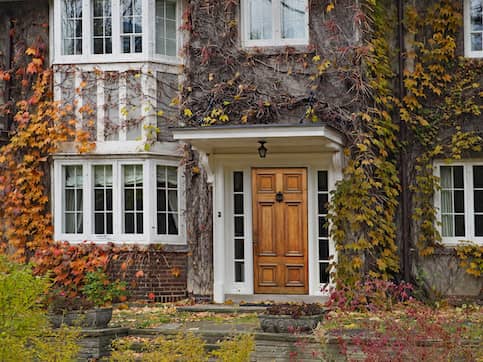Restrictive Covenants: How They Affect Your Property

If you want to move into a planned community, you may have to live within the terms of a restrictive covenant. A restrictive covenant outlines what you can and can’t do in the community, and it can have a significant impact on your lifestyle.
Let’s take a closer look at restrictive covenants in real estate and what they mean for you as a homeowner.
What Is A Restrictive Covenant In Real Estate?
In real estate, a restrictive covenant creates a deed-restricted community. It’s legally binding and states what homeowners can and can’t do with their house or land. Buyers can face penalties if they don’t follow the covenant’s obligations.
These constraints may be spelled out in a property deed or a Declaration of Covenants, Conditions and Restrictions. Homeowners associations typically enforce the CC&Rs.
When you sign a restrictive covenant, you agree to abide by the rules governing the real property. The agreement limits the changes you can make to your home, but it protects the area’s property values.
What’s Your Goal?
Home Purchase
Home Refinance
Tap Into Equity
Types Of Restrictive Covenants
Not all restrictive covenants in real estate are the same. The most common ones pertain to the land, property alterations and how you use your home. Here are some examples of restrictive covenants.
Restrictive Covenants, Explained
| Type of Restrictive Covenant | Purpose |
|---|---|
| Land Use Restrictions | This restricts how homeowners can manage and modify their land. Examples include restrictions on fence options, the type of animals allowed and the use of outbuildings, such as sheds. |
| Property Alterations And Aesthetics Restrictions | This defines how you can alter the property’s features, including colors, and may affect what you can do to a home’s exterior. |
| Property Maintenance | This mandates specific types of property maintenance to protect the area’s aesthetic appeal and may limit how long you can let something go, such as cutting the lawn, cleaning the gutters or repairing the roof. |
| Number Of Tenants | This limits how many people can reside in a home, especially if non-family members live with you. |
| Property Use | This governs how you use the property. For example, some associations won’t allow you to use your home as a rental property. If they do, they may have limits in place. |
Everyday Examples Of Restrictive Covenants
Restrictive covenants vary by association, but here are a few constraints typical of a condominium development or covenant-controlled community:
- Paint colors. Most associations control the color you can paint your house. This prevents homeowners from painting their house an unusual color that could hurt property values.
- Landscaping. Some covenants moderate the type, size and color of landscaping homeowners can have.
- Fencing. Some associations don’t allow fences, and those that do may regulate the fence type and height.
- Home business. Some associations don’t allow you to run a business from your home. If they do, they may restrict the type of business you can operate. You may also have to follow zoning regulations based on city ordinances.
Ready To Become A Homeowner?
Get matched with a lender that can help you find the right mortgage.
How Are Restrictive Covenants Enforced?
The HOA usually enforces the covenants. Depending on how badly someone violates the covenants, various consequences could exist.
If property owners choose not to follow the association’s rules, they could face penalties or financial repercussions. These include:
- Warnings or fines. Most HOAs offer a warning with a deadline to fix the issue. If you don’t rectify the situation, your HOA will likely fine you for not obeying the legal documentation.
- Lawsuits. Most covenant violations don’t end up in a lawsuit. However, if a homeowner continually violates the rules or doesn’t fix an issue after several warnings and fines, the HOA may file a lawsuit.
- File liens. If a homeowner doesn’t pay their HOA dues or fines assessed for a covenant violation, the HOA can file a lien against their property. Before the property owner can receive funds from selling the home, they must pay off the lien.
Take The First Step To Buying A Home
Find a lender that will work with your unique financial situation.
Pros And Cons Of Restrictive Covenants
Restrictive covenants can protect property owners but also keep them from living according to their preferred standards. Let’s take a look at some advantages and disadvantages you may encounter with restrictive covenants.
Pros
- Restrictive covenants ensure that homeowners properly maintain their property to avoid creating a neighborhood eyesore.
- You don’t have to worry about obnoxious features on a neighbor’s property.
- The deed restrictions can limit the number of people living in a house, which can help eliminate excessive noise and other situations a crowded home can create.
Cons
- The restrictive covenants can be too strict, making it hard to manage your home as you wish.
- You might have to get approval for any upgrades or changes you make to your home.
- If you violate the restrictive covenant, you’ll likely be fined or face more serious consequences.
FAQ: Restrictive Covenants In Real Estate
Next, see the answers to some typical questions about restrictive covenants in real estate.
Restrictive covenants are allowed in real estate to an extent. However, discriminatory restrictive covenants are illegal and unenforceable. In 1968, Congress enacted the Fair Housing Act, banning HOAs from blocking individuals from owning or living in a home based on:
– Race.
– Color.
– Religion.
– Sex (including gender identity and sexuality).
– National origin.
– Family status.
– Disability.
– Other protected classes.
A house covenant is another name for a restrictive covenant in real estate.
You may face fees and lawsuits or have a lien placed against your home if you breach a restrictive covenant. Consequences will vary based on the covenant terms, the type of violation and whether you’ve broken the covenant before. Look at your Declaration of CC&Rs or check with your HOA to find out your community’s specific policies.
The Bottom Line
Restrictive covenants can be both good and bad. They keep a neighborhood looking its best by demanding proper maintenance and aesthetically pleasing features. However, these covenants can be more restricting than many homeowners care for them to be. If you’re aiming to move into a planned community, carefully read the fine print of the community’s requirements.











